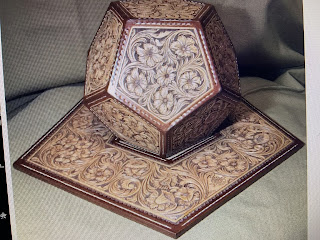 |
| Akiko Okada nunha das súas clases. |
Comezamos un novo curso en EMAO con moita ilusión. Para a próxima semana teremos as probas de acceso e os alumnos de Superior e Perfeccionamento 1 comezarán as clases.
Para este curso preparamos unha serie de entrevistas para coñecer un pouco máis de preto artesáns que foron recoñecidos internacionalmente co premio Al Stohlman, por así dicilo , o Premio Nobel do Coiro. Comezamos este curso cunha pequena entrevista co xaponesa Akiko Okada recoñecido con este premio en 2013.
- Canto tempo levas traballado o coiro?
Levo traballando o coiro 40 anos.
- Canto tempo levas traballado o coiro?
Levo traballando o coiro 40 anos.
- Como empezaches no coiro?
Comecei a traballar o coiro aprendendo a distancia con Craft Japan.
Comecei a traballar o coiro aprendendo a distancia con Craft Japan.
- Que ten o coiro que non teña outro material?
Cando vin o traballo de Al Stohlman no seu Museo en Tandy, fun atraida pola súa beleza. Non podería pensar en outros materiais.
- Entre as diferentes técnicas que coñeces, cal é a túa favorita?
A miña técnica favorita é o labrado.
- Que peza tes ganas de facer e aínda non fixeches?
Me gusta facer os deseño para os labrados que decoran as miñas pezas de coiro.
Cando vin o traballo de Al Stohlman no seu Museo en Tandy, fun atraida pola súa beleza. Non podería pensar en outros materiais.
- Entre as diferentes técnicas que coñeces, cal é a túa favorita?
A miña técnica favorita é o labrado.
- Que peza tes ganas de facer e aínda non fixeches?
Me gusta facer os deseño para os labrados que decoran as miñas pezas de coiro.
 |
| Unha das pezas máis emblemáticas de Akiko Okada |
- Que consello daríaslle/daríanlle a alguén que está a empezar no traballo do coiro?
Creo que cando estou a facer un deseño para un labrado é importante debuxar as liñas fluídas da vide e na cantidade adecuada ó traballo.
- Tes algunha ferramenta única ou especial?
Si, teño.
- Tes algún artesán do coiro que consideres inspirador?
Si, o teño.
-Que significa a ti para ser recoñecido co Al Stohlman Award?
Penso que podería ser o recoñecemento á miña contribución ao desenvolvemento do traballo do coiro : fun ensinando case o mesmo tempo que eu iba desenvolvendo o meu traballo en coiro ensinando de nenos a adultos, de principiantes a mestres en Xapón, Australia e os EE.UU.
We started a new course at EMAO with great enthusiasm. For next week we will have the exams and the students of Superior and Improvement 1 will begin classes. For this course we have prepared a series of interviews to get to know a little more closely artisans who have been internationally recognized with the Al Stohlman Award, so to speak the Nobel Prize for Leather. We start this course with a short interview with the Japanese Akiko Okada recognized with this award in 2013.
-How long have you being working with leather?
I have been working for 40 years.
-How did you start in leathercraft?
I started leathercraft by distance learning in Craft Japan.
-What does the leather have that another material doesn’t?
When I saw Al Stohlman's work in his museum in Tandy, I was moved by its beauty. I couldn't think other materials.
-Among the different techniques you know, which one is your favourite?
My favourite technique is carving/tooling in the leather.
-Which work piece do you feel like doing and you haven’t done yet?
I like to make a carving pattern on my leather art pieces.
-What would be your piece of advice for anyone who is beginning?
I think when I am making a design, it is important to draw the flowing vine lines and the amount drawn in the work.
-Have you got any ‘special’ or unique tool?
Yes, I have.
 |
| Unha subela, a ferramenta favorita de Akiko Okada. |
-Do you have a leathercrafter that you consider inspiring?
Yes, I have.
-What does it mean to you to be recognized with the Al Stohlman Award?
I think that it might be recognized with my contribution to the development of the leather work : I have been teaching almost as long as I have been doing leather work from children to adults, beginners to masters in Japan, Australian and the US.
Yes, I have.
-What does it mean to you to be recognized with the Al Stohlman Award?
I think that it might be recognized with my contribution to the development of the leather work : I have been teaching almost as long as I have been doing leather work from children to adults, beginners to masters in Japan, Australian and the US.

Ningún comentario:
Publicar un comentario
¡Anímate a participar cos teus comentarios!